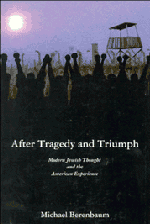Book contents
- Frontmatter
- Contents
- Foreword
- Introduction
- PART I THE HOLOCAUST IN CONTEMPORARY AMERICAN CULTURE
- PART II JEWISH THOUGHT AND MODERN HISTORY
- 8 Franz Rosenzweig and Martin Buber Reconsidered
- 9 The Problem of Pluralism in Contemporary Orthodoxy: Philosophy and Politics
- 10 From Auschwitz to Oslo: The Journey of Elie Wiesel
- 11 Jacob Neusner and the Renewal of an Ever-Dying People
- 12 Political Zionism's Would-Be Successors: Sectarianism, Messianism, Nationalism, and Secularism
- 13 The Situation of the American Jew
- Notes
- Index
11 - Jacob Neusner and the Renewal of an Ever-Dying People
Published online by Cambridge University Press: 06 January 2010
- Frontmatter
- Contents
- Foreword
- Introduction
- PART I THE HOLOCAUST IN CONTEMPORARY AMERICAN CULTURE
- PART II JEWISH THOUGHT AND MODERN HISTORY
- 8 Franz Rosenzweig and Martin Buber Reconsidered
- 9 The Problem of Pluralism in Contemporary Orthodoxy: Philosophy and Politics
- 10 From Auschwitz to Oslo: The Journey of Elie Wiesel
- 11 Jacob Neusner and the Renewal of an Ever-Dying People
- 12 Political Zionism's Would-Be Successors: Sectarianism, Messianism, Nationalism, and Secularism
- 13 The Situation of the American Jew
- Notes
- Index
Summary
No one has offered a more poignant and serious critique of the Holocaust's role in American Jewish life than Jacob Neusner. This chapter profiles Neusner as a scholar and highlights his demurral from American Jewry's attempt to build its future on the ashes of Auschwitz. In the end, Neusner finds no way to circumvent the Holocaust.
Jacob Neusner is a phenomenon in contemporary scholarship. At fifty-eight, he is the author of more than 170 books and the editor of scores more. His students hold some of the most prestigious appointments in universities throughout the world. Neusner is in the midst of at least five multiyear, multivolume projects. Under his leadership, all the major texts of classical Judaism will be translated into English in an avalanche of work that would take lesser scholars a lifetime. Neusner is still growing intellectually, still refining his thoughts.
No contemporary scholar in the humanities is as dominant in his field as Neusner. His influence can be felt in the study of religion, both ancient and modern. His specialties are the Talmud and the interaction between Judaism and Christianity. As a scholar, Neusner is not only prolific but wide-ranging. He has written works as diverse as a history of the Jews of Iran (Persia) and the first English translation of the long-neglected Talmud of the Land of Israel (Talmud Yerushalmi). He has written biographies of rabbinic masters and rewritten them as his thinking changed. Neusner came to the study of Talmud rather late in life. Raised as a Reform Jew in suburban West Hartford, Connecticut, he concentrated on classical rabbinic texts only after he completed his undergraduate education at Harvard and a postgraduate year at Oxford.
- Type
- Chapter
- Information
- After Tragedy and TriumphEssays in Modern Jewish Thought and the American Experience, pp. 126 - 133Publisher: Cambridge University PressPrint publication year: 1990



